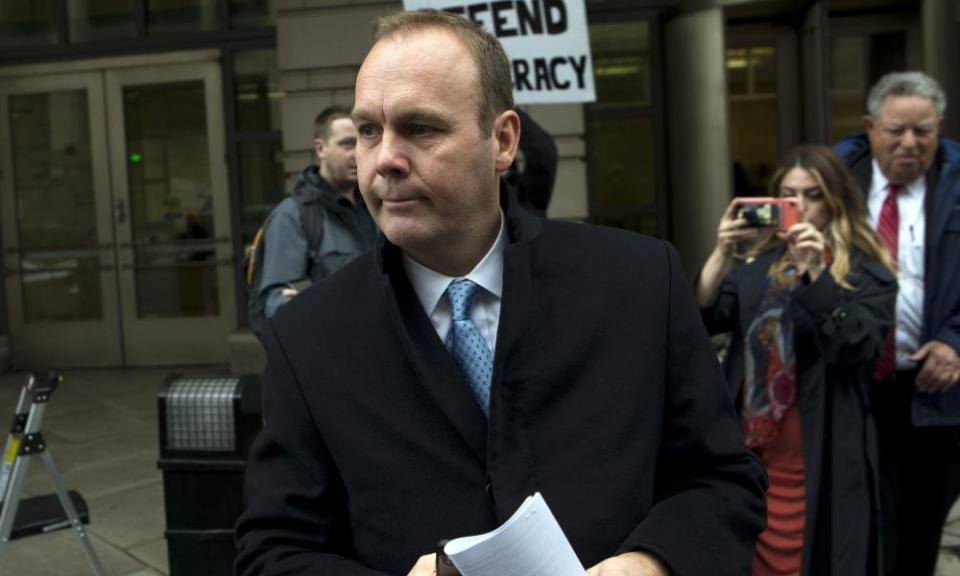Speculation mounts over who Trump might pardon after Flynn

Amid widespread outcry over Donald Trump’s pardon of Michael Flynn, speculation surged about who might be next for clemency from the defeated president.
Rick Gates, Trump’s 2016 deputy campaign chair, told the New York Times the president “knows how much those of us who worked for him have suffered, and I hope he takes that into consideration if and when he grants any pardons”.
Related: After Flynn pardon, could Trump do the same for himself?
Gates was one of many Trump aides convicted under the former special counsel Robert Mueller’s investigation of Russian election interference and links between Trump and Moscow. After pleading guilty to financial fraud and lying to investigators, he was sentenced to 45 days in jail.
Gates also told the Times his motivation for criticising Mueller in a recent book “was not to seek a pardon; it was to expose the truth about the Russia investigation”.
Flynn, a retired general who was fired from the Defense Intelligence Agency by Barack Obama in 2014, became a trusted campaign surrogate for Trump. But Trump fired him as national security adviser after just 24 days on the job, for lying to Vice-President Mike Pence about contacts with Russian officials.
He pleaded guilty to lying to the FBI but was not sentenced before Trump pardoned him on Wednesday, saying: “Have a great life General Flynn!”
Trump has already commuted a more than three-year sentence handed to Roger Stone, a longtime ally, for obstruction, lying to Congress and witness intimidation.

Former campaign manager Paul Manafort is in home confinement on a seven-year sentence for fraud. George Papadopoulos, a foreign policy adviser, was sentenced to 14 days in jail after pleading guilty to lying to the FBI. Michael Cohen, Trump’s former lawyer and fixer, was convicted of crimes including lying to Congress and orchestrating hush money payments and is completing a three-year term at home. As he has conclusively turned on the president, a pardon seems unlikely.
Papadopoulos mounted an unsuccessful run for Congress and has also published a book. He told the Times: “Of course I would be honored to be pardoned.”
Outside the Mueller investigation, former campaign chief executive and White House strategist Steve Bannon was charged with fraud regarding fundraising for a border wall. Rudy Giuliani, the president’s lawyer and election lawsuit bulldog, is reportedly under investigation regarding possible violations of lobbying law. Elliott Broidy, a Trump fundraiser, pleaded guilty to lobbying charges.
In August, Patrick Cotter, a former federal prosecutor who helped convict the mob boss John Gotti, told the Guardian: “I believe it unprecedented in any US administration for so many of the closest circle of persons around the president to have been shown to be conmen, grifters and base criminals.
“While previous administrations had their share of those trying to personally profit and those willing to break the law to serve the political interests of the president, what is unique about the Trump administration is the large number of people in direct contact with the president, often for years, who are revealed to be out-and-out fraudsters for whom crime is apparently part of their lifestyle and character.”
Trump has pardoned allies including Joe Arpaio and Bernard Kerik and observers think he may even try to pardon himself. However, it is not clear such a move would be possible and if it was, it would not apply to cases at state level, such as those in New York concerning tax issues and campaign finance.
Trump has not conceded defeat by Joe Biden but he lost the electoral college by 306-232 and the popular vote by 6m ballots and will leave office on 20 January. Jockeying for pardons is a common feature of the waning days of any presidency. On one day in December 2016, Barack Obama issued 78 pardons and commuted 153 federal sentences.
The Times also reported that Jared Kushner, Trump’s son-in-law and chief adviser, is leading an “ad-hoc” team “with a goal of announcing as many as hundreds of commutations for offenders now in jail for crimes ranging from non-violent drug convictions to mail fraud and money laundering”.
Most such pardons would be less controversial than the one handed to Flynn. However, among those campaigning for a pardon is Joseph Maldonado-Passage. Better known as Joe Exotic, the zookeeper subject of hit Netflix documentary Tiger King, he received a 22-year sentence for trying to hire a hitman to kill a rival.
Flynn retains influential supporters on the political right. The Wall Street Journal editorial board called his pardon “an overdue act of justice that ends four years of political harassment, unjustified prosecution and judicial abuse”.
Related: 'Conmen, grifters and criminals': why is Trump's circle so at odds with the law?
Critics pointed to Flynn’s guilty plea and the fact that contrary to a statement from the White House press secretary, Kayleigh McEnany, a pardon does not imply innocence.
Senior Democrats, including the House speaker, Nancy Pelosi; the Senate minority leader, Chuck Schumer; and the House intelligence chair, Adam Schiff, were among those to condemn the Flynn pardon as a serious abuse of power.
In a tweet, former federal prosecutor and CNN analyst Elie Honig laid out the facts of the case.
“Facts: Michael Flynn lied to the FBI about Russia. Flynn pled guilty, twice. Trump tried to kill the case and publicly floated a pardon. Flynn cooperated with Mueller, and then stopped. [Attorney general William] Barr tried to kill [the Department of Justice’s] own case but the judge resisted. Trump pardoned Flynn.”


